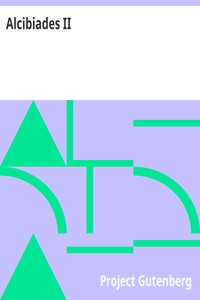Alcibiades II by Plato
"Alcibiades II" by Plato is a philosophical dialogue, likely attributed to an imitator of Plato rather than the philosopher himself, and is believed to have been written in the second or third century BC. This work explores themes of knowledge, wisdom, and the nature of prayer, engaging with the idea of how humans petition the gods and the potential dangers of such requests, particularly what it means to seek good while unknowingly
wishing for harm. In this dialogue, Socrates engages Alcibiades in a deep philosophical conversation about the nature of wisdom and the importance of discernment in prayer. They discuss the folly of seeking power and the consequences of ignorance, illustrated through examples of historical figures and myths. Alcibiades grapples with the understanding that many desires may lead to greater evils if granted, emphasizing the necessity of proper knowledge and the wisdom behind discerning what constitutes a true good. The dialogue concludes with Alcibiades realizing the importance of self-awareness before making prayers or decisions and opting to wait for guidance on how to approach the gods correctly. (This is an automatically generated summary.)
Read now or download (free!)
| Choose how to read this book | Url | Size | ||||
|---|---|---|---|---|---|---|
| Read online (web) | https://www.gutenberg.org/ebooks/1677.html.images | 65 kB | ||||
| EPUB3 (E-readers incl. Send-to-Kindle) | https://www.gutenberg.org/ebooks/1677.epub3.images | 81 kB | ||||
| EPUB (no images, older E-readers) | https://www.gutenberg.org/ebooks/1677.epub.noimages | 79 kB | ||||
| Kindle | https://www.gutenberg.org/ebooks/1677.kf8.images | 150 kB | ||||
| older Kindles | https://www.gutenberg.org/ebooks/1677.kindle.images | 142 kB | ||||
| Plain Text UTF-8 | https://www.gutenberg.org/ebooks/1677.txt.utf-8 | 53 kB | ||||
| Download HTML (zip) | https://www.gutenberg.org/cache/epub/1677/pg1677-h.zip | 78 kB | ||||
| There may be more files related to this item. | ||||||
Similar Books
About this eBook
| Author | Plato (spurious and doubtful works), 428? BCE-348? BCE |
|---|---|
| Title | Alcibiades II |
| Note | Wikipedia page about this book: https://en.wikipedia.org/wiki/Second_Alcibiades |
| Note | Socrates |
| Note | Reading ease score: 66.7 (8th & 9th grade). Neither easy nor difficult to read. |
| Credits | Produced by Sue Asscher, and David Widger |
| Language | English |
| LoC Class | PA: Language and Literatures: Classical Languages and Literature |
| Subject | Classical literature |
| Subject | Socrates, 470 BC-399 BC |
| Subject | Virtue -- Early works to 1800 |
| Subject | Alcibiades |
| Category | Text |
| EBook-No. | 1677 |
| Release Date | Mar 1, 1999 |
| Most Recently Updated | Jan 16, 2013 |
| Copyright Status | Public domain in the USA. |
| Downloads | 272 downloads in the last 30 days. |
| Project Gutenberg eBooks are always free! | |

